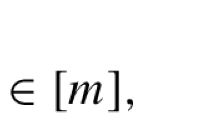Abstract
Semidefinite programming, SDP, relaxations have proven to be extremely strong for many hard discrete optimization problems. This is in particular true for the quadratic assignment problem, QAP, arguably one of the hardest NP-hard discrete optimization problems. There are several difficulties that arise in efficiently solving the SDP relaxation, e.g., increased dimension; inefficiency of the current primal–dual interior point solvers in terms of both time and accuracy; and difficulty and high expense in adding cutting plane constraints. We propose using the alternating direction method of multipliers ADMM in combination with facial reduction, FR, to solve the SDP relaxation. This first order approach allows for: inexpensive iterations, a method of cheaply obtaining low rank solutions; and a trivial way of exploiting the FR for adding cutting plane inequalities. In fact, we solve the doubly nonnegative, DNN, relaxation that includes both the SDP and all the nonnegativity constraints. When compared to current approaches and current best available bounds we obtain robustness, efficiency and improved bounds.
Similar content being viewed by others
Notes
We do not include the times as they were much greater than those by the ADMM approach, e.g., hours instead of minutes and a day instead of an hour.
References
Anstreicher, K.M.: Recent advances in the solution of quadratic assignment problems. Math. Program. 97(1–2), 27–42 (2003)
Anstreicher, K.M., Brixius, N.W.: A new bound for the quadratic assignment problem based on convex quadratic programming. Math. Program. 89(3), 341–357 (2001)
Bhati, R.K., Rasool, A.: Quadratic assignment problem and its relevance to the real world: a survey. Int. J. Comput. Appl. 96(9), 42–47 (2014)
Birkhoff, G.: Three observations on linear algebra. Univ. Nac. Tucumán. Revista A 5, 147–151 (1946)
Boyd, S., Parikh, N., Chu, E., Peleato, B., Eckstein, J.: Distributed optimization and statistical learning via the alternating direction method of multipliers. Found. Trends Mach. Learn. 3(1), 1–122 (2011)
Burer, S., Monteiro, R.D.C.: Local minima and convergence in low-rank semidefinite programming. Math. Program. 103(3), 427–444 (2005)
Burkard, R.E., Karisch, S., Rendl, F.: QAPLIB–a quadratic assignment problem library. Eur. J. Oper. Res. 55, 115–119 (1991)
Burkard, R.E., Karisch, S.E., Rendl, F.: QAPLIB–a quadratic assignment problem library. J. Global Optim. 10(4), 391–403 (1997)
de Klerk, E., Sotirov, R.: Exploiting group symmetry in semidefinite programming relaxations of the quadratic assignment problem. Math. Program. 122(2), 225–246 (2010)
Eckart, C., Young, G.: The approximation of one matrix by another of lower rank. Psychometrica 1(3), 211–218 (1936)
Edwards, C.S.: A branch and bound algorithm for the Koopmans–Beckmann quadratic assignment problem. Math. Program. Study 13, 35–52 (1980)
Golub, G.H., Ye, Q.: An inverse free preconditioned Krylov subspace method for symmetric generalized eigenvalue problems. SIAM J. Sci. Comput. 24(1), 312–334 (2002). (electronic)
Ito, N., Kim, S., Kojima, M., Takeda, A., Toh, K.C.: Bbcpop: a sparse doubly nonnegative relaxation of polynomial optimization problems with binary, box and complementarity constraints. arXiv preprint arXiv:1804.00761 (2018)
Jain, R., Yao, P.: A parallel approximation algorithm for positive semidefinite programming. In: 2011 IEEE 52nd Annual Symposium on Foundations of Computer Science—FOCS 2011, pp. 463–471. IEEE Computer Soc., Los Alamitos, CA (2011)
Jiang, Bo, Liu, Ya-Feng, Wen, Zaiwen: \(l_p\)-norm regularization algorithms for optimization over permutation matrices. SIAM J. Optim. 26(4), 2284–2313 (2016)
Kim, S., Kojima, M., Toh, K.-C.: A Lagrangian-DNN relaxation: a fast method for computing tight lower bounds for a class of quadratic optimization problems. Math. Program. 156(1–2), 161–187 (2016)
Koopmans, T.C., Beckmann, M.J.: Assignment problems and the location of economic activities. Econometrica 25, 53–76 (1957)
Lawler, E.L.: The quadratic assignment problem. Manag. Sci. 9, 586–599 (1963)
Liao, Z.: Branch and bound via ADMM for the quadratic assignment problem. Master’s thesis, University of Waterloo (2016)
Pardalos, P., Rendl, F., Wolkowicz, H.: The quadratic assignment problem: a survey and recent developments. In: Pardalos, P.M., Wolkowicz, H. (eds.) Quadratic Assignment and Related Problems (New Brunswick, NJ, 1993), pp. 1–42. American Mathematical Society, Providence, RI (1994)
Pardalos, P., Wolkowicz, H. (eds.).: Quadratic assignment and related problems. American Mathematical Society, Providence, RI, 1994. Papers from the workshop held at Rutgers University, New Brunswick, New Jersey, May 20–21 (1993)
Pong, T.K., Sun, H., Wang, N., Wolkowicz, H.: Eigenvalue, quadratic programming, and semidefinite programming relaxations for a cut minimization problem. Comput. Optim. Appl. 63(2), 333–364 (2016)
Povh, J., Rendl, F.: Copositive and semidefinite relaxations of the quadratic assignment problem. Discret. Optim. 6(3), 231–241 (2009)
Rendl, F., Sotirov, R.: Bounds for the quadratic assignment problem using the bundle method. Math. Program. 109(2–3), 505–524 (2007)
Toh, K.C., Todd, M.J., Tütüncü, R.H.: SDPT3—a MATLAB software package for semidefinite programming, version 1.3. Optim. Methods Softw. 11(1–4), 545–581 (1999)
Wen, Z., Goldfarb, D., Yin, W.: Alternating direction augmented Lagrangian methods for semidefinite programming. Math. Program. Comput. 2(3–4), 203–230 (2010)
Yang, L., Sun, D., Toh, K.-C.: \({\rm SDPNAL}+\): a majorized semismooth Newton-CG augmented Lagrangian method for semidefinite programming with nonnegative constraints. Math. Program. Comput. 7(3), 331–366 (2015)
Zhao, Q., Karisch, S.E., Rendl, F., Wolkowicz, H.: Semidefinite programming relaxations for the quadratic assignment problem. J. Comb. Optim. 2(1), 71–109 (1998)
Zhao, X.Y., Sun, D., Toh, K.C.: A Newton-CG augmented lagrangian method for semidefinite programming. SIAM J. Optim. 20(4), 1737–1765 (2010)
Author information
Authors and Affiliations
Corresponding author
Additional information
The code can be downloaded from the author’s webpage https://xu-yangyang.github.io/ADMM_QAP/ The software that was reviewed as part of this submission was given the DOI (Digital Object Identifier) 10.5281/zenodo.1412139.
This work is partially supported by NSERC and AFOSR. The first version of this paper appeared in optimization online, Dec. 16, 2015 and in arXiv:1512.05448, Dec. 17, 2015
Research supported by The Natural Sciences and Engineering Research Council of Canada and by AFOSR.
Research partly supported by NSF Grant DMS-1719549.
Rights and permissions
About this article
Cite this article
Oliveira, D.E., Wolkowicz, H. & Xu, Y. ADMM for the SDP relaxation of the QAP. Math. Prog. Comp. 10, 631–658 (2018). https://doi.org/10.1007/s12532-018-0148-3
Received:
Accepted:
Published:
Issue Date:
DOI: https://doi.org/10.1007/s12532-018-0148-3
Keywords
- Quadratic assignment problem
- Semidefinite programming relaxation
- Alternating direction method of multipliers
- Facial reduction
- Doubly nonnegative
- Large scale




